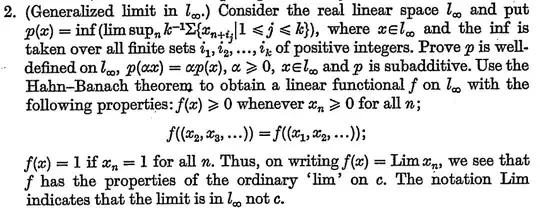I am trying to solve the following problem (found in Maddox's book "Elements of Functional Analysis", page 128):
So we have the function $p:l_\infty\rightarrow\mathbb{R}$ given by
$$ p(x) = \inf\left\{\limsup_{n\rightarrow\infty}\left(\frac{1}{k}\sum_{j=1}^k x_{n+i_j}\right) \right\} $$
In which the infimum is taken over all finite sets of positive integers $\{i_1,\ldots,i_k\}$.
I already showed that:
- $p$ is well defined in $l_\infty$
- $p(\alpha x)=\alpha p(x)$, for all $x\in l_\infty$ and $\alpha >0$
- $p$ is subadditive, i.e $p(x+y)\leq p(x)+p(y)$, for all $x,y\in l_\infty$
This part I'm not sure that it's the best way to do it:
To obtain a functional as the problem states, I defined first another functional $g:c\rightarrow \mathbb{R}$ ($c$={space of convergent sequences}), given by:
$$ g((x_n)_n) = \lim_{n\rightarrow\infty} x_n $$
It was not difficult to show that:
- $g$ is linear
- $g(x)\leq p(x)$, for all $x\in c$. (Actually we'll have $g(x)=p(x)$)
- $g((1,1,1,\ldots))=1$
Now, the Hahn Banach Extension Theorem states that there is a functional $f:l_\infty\rightarrow \mathbb{R}$ such that:
- $f(x)=g(x)$, for all $x\in c$
- $f(x)\leq p(x)$, for all $x\in l_\infty$
Now I just have to show that $f$ satisfies the conditions given by the problem, which are:
- $f(x)=1$ if $x_n= 1$ for all $n$
- $f(x)\geq 0$ if $x_n\geq 0$ for all $n$
- $f((x_2,x_3,\ldots))=f((x_1,x_2,\ldots))$
(1) is straightforward, since the condition is valid for $g$.
My Difficulties:
(2) I managed to demonstrate this one, but I'm not sure I'm correct, this is my solution:
For every $x\in l_\infty$ we have
$$ f(x) \leq p(x) = \inf\left\{\limsup_{n\rightarrow\infty}\left(\frac{1}{k}\sum_{j=1}^k x_{n+i_j}\right) \right\} $$
So we have
\begin{align} -f(x) = f(-x) \leq p(x) &= \inf\left\{\limsup_{n\rightarrow\infty}\left(\frac{1}{k}\sum_{j=1}^k (-x_{n+i_j})\right) \right\}\\ &= \inf\left\{\limsup_{n\rightarrow\infty}\left(-\frac{1}{k}\sum_{j=1}^k x_{n+i_j}\right) \right\}\\ &= \inf\left\{-\liminf_{n\rightarrow\infty}\left(\frac{1}{k}\sum_{j=1}^k x_{n+i_j}\right) \right\}\\ &= -\sup\left\{\liminf_{n\rightarrow\infty}\left(\frac{1}{k}\sum_{j=1}^k x_{n+i_j}\right) \right\} \end{align}
From which we get
$$ f(x) \geq \sup\left\{\liminf_{n\rightarrow\infty}\left(\frac{1}{k}\sum_{j=1}^k x_{n+i_j}\right) \right\} $$
And clearly if $x_n\geq 0$ for all $n$, then
$$ f(x) \geq \sup\left\{\liminf_{n\rightarrow\infty}\left(\frac{1}{k}\sum_{j=1}^k x_{n+i_j}\right) \right\} \geq 0 $$
Is this correct?
(3) This is my biggest problem, I have little clue on how to show this, it is clear that in $c$ it is valid. I have the feeling that using the following inequality I can get somewhere:
$$ \sup\left\{\liminf_{n\rightarrow\infty}\left(\frac{1}{k}\sum_{j=1}^k x_{n+i_j}\right) \right\} \leq f(x) \leq \inf\left\{\limsup_{n\rightarrow\infty}\left(\frac{1}{k}\sum_{j=1}^k x_{n+i_j}\right) \right\} $$
but I haven't been able to do much.
If we define $$q(x)=\sup\left\{\liminf_{n\rightarrow\infty}\left(\frac{1}{k}\sum_{j=1}^k x_{n+i_j}\right) \right\}$$
I have no trouble in noticing that:
\begin{align} p((x_2,x_3,\ldots))=p((x_1,x_2,\ldots))\\ q((x_2,x_3,\ldots))=q((x_1,x_2,\ldots)) \end{align}
If we had $p(x)=q(x)$ then it would be done, but I think this is not the case.
Any suggestions?
